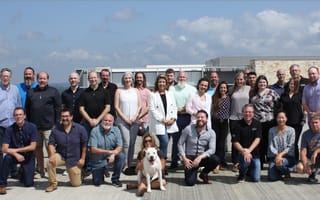
Austin-based Olea Edge Analytics announced Wednesday that it has raised $35 million to expand its artificial intelligence-driven solution to identifying problems with municipal water systems.
The Series C funding round, led by Insight Partners, brings Olea Edge Analytics’ funding total to $50.6 million. The company is valued at $108 million.
Olea attaches sensors to municipal water systems to monitor and manage each component throughout the network, giving utility departments previously unavailable insights and recommendations on how to return their resources to optimal performance.
“We use cellular technology, artificial intelligence and machine learning to see if the device is working correctly, and if it's not working correctly, we will tell you what’s broken and what you need to repair,” CEO Dave Mackie told Built In.
Through a combination of AI, machine learning and edge computing, the company helps cities monitor and manage critical water assets, including large commercial and industrial meters.
Mackie said the technology is particularly useful in identifying discrepancies in commercial and industrial water meters, which might only make up 1 to 2 percent of a city’s water meters but account for 40 percent of a city’s water revenue.

Olea’s technology is used in eight cities, including Atlanta, where more than 10,000 sensors are used to monitor the municipal water system. Mackie expects to be in 15 or 20 cities by this time next year.
Mackie said cities have quickly found a return on their investment by recovering lost revenue from residents.
“What we say is, ‘If you give us a nickel, we’ll give you a quarter. If you give us a dollar, we’ll give you back five,’” he said. “The revenue recovery happens very quickly and the ROI is fast. In less than a year, we can find you at least three or four times the money you spent.”
Olea just reached a headcount of 50 employees and hired full-time human resources staff. Mackie said he expects to reach 100 to 125 people by the end of 2022, depending on the pace of the company's growth.
As urban centers grow in population and density, Mackie said he believes his technology will help cities monitor and upgrade their infrastructure to better serve residents.
“Declining access to clean drinking water is becoming more and more challenging,” he said. “As it does, the ability of these cities to manage budgets and pay for what they need to service their constituents is going to be really important. We believe we’re right in the middle of all that.”




